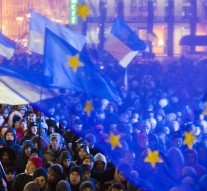
Dutch People’s Fears Defeat Peace and Stability for Ukraine
External Relations 7 April 2016On the 6th April, peace and stability for Ukraine and the entire East-European region have been defeated by Dutch citizens’ fears. When asked to express their opinion on the European Union’s association agreement with Ukraine, Dutch voters said no. And they were crystal clear: 64 % were against the pact intended to promote better trade relations with the former Soviet satellite and just 36 % in favour of it.
After initial doubts, the ballot was declared valid, since 32.2% of the electorate had turned out, passing the 30% threshold. Although non-binding in theory, the referendum must be taken into account.
It would be embarrassing for the government if it paid no attention to the voting results. Furthermore, this would provide arguments to the loose coalition that organised this ballot just to push a broader anti-EU agenda and humiliate during the Netherlands holds the rotating EU presidency.
Signed almost two years ago, on 27th June 2014, the EU-Ukraine Association Agreement has been ratified by all others EU member states. So the Netherlands are now the obstacle to the success of the agreement, which, paradoxically, has been approved previously by both houses of the Dutch Parliament.
What are the possible solutions for the Dutch government now?
It remains unclear what will happen to the agreement how that the vote is declared valid. As suggested by Dr. Aaron Matta, Senior Researcher at The Hague Institute for Global Justice, there are still some ways open for the Dutch Government to run with the hare and hunt with the hounds.
In theory, the Dutch Government may use the outcome of this vote to solicit for a reopening of negotiations, so to alter the treaty. However, this is improbable because it would be almost impossible to bring the EU, its 28 member states and Ukraine back to the negotiating table, especially now that all other member states and Ukraine have already ratified the Agreement.
Therefore, in case the Dutch government accepted the referendum outcome, an unprecedented political solution would be necessary. A solution might be to add an adjusting protocol to the agreement so to opt out of some provisions, meaning that those provisions in the Association Agreement belonging to member state competences would not be applicable in The Netherlands.
Otherwise, some kind of additional protocol, act or declaration may be envisaged, aimed at responding to the main concerns of the voters, such as stressing the fight against corruption or the fact that Ukraine will not access the EU any time soon.
What may be the consequences of the referendum outcome?
Halted by the Dutch referendum, this is an unprecedented situation for the EU’s external relations. Under the Treaty of Lisbon, the provisional application of the Agreement will continue as far as the Agreement altogether is unanimously approved by the Council of the EU.
Now that a unanimity vote risks not to be reached due to the referendum results, this could severely affect EU foreign policy, causing greater instability, incoherence and a decrease of its legitimacy.


